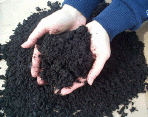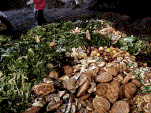Potential Sources of Compost in Connecticut
Leaf Compost
 By State regulation, leaves are a mandatory recyclable item which means that they cannot be disposed in a landfill or incinerator. They must be recycled, and the most common way to recycle leaves is to turn them into compost. There are now about 100 leaf composting facilities registered with the Connecticut DEEP, most of which are municipally owned and process town generated leaves. Municipal operations tend only to accept leaves generated by that town, and may also provide small quantities of finished compost to residents for free or at a nominal charge. There are also several private leaf composting facilities which have been established in response to the demand for purchasing finished compost and for places to recycle leaves. Private facilities will usually accept leaves from many different sources and have larger quantities of compost available for bulk sale.
By State regulation, leaves are a mandatory recyclable item which means that they cannot be disposed in a landfill or incinerator. They must be recycled, and the most common way to recycle leaves is to turn them into compost. There are now about 100 leaf composting facilities registered with the Connecticut DEEP, most of which are municipally owned and process town generated leaves. Municipal operations tend only to accept leaves generated by that town, and may also provide small quantities of finished compost to residents for free or at a nominal charge. There are also several private leaf composting facilities which have been established in response to the demand for purchasing finished compost and for places to recycle leaves. Private facilities will usually accept leaves from many different sources and have larger quantities of compost available for bulk sale.
Compost Made From Source-Separated Organics
 Some private facilities and some farms may also be permitted to accept other types of organics that have been source separated. "Source separated" is a term used to describe compostable items that have been separated from the waste stream at the point of generation, instead of being combined with garbage and then sorted out at another location. Some examples of source separated organics include grocery produce spoils, manure, municipal leaves and food processing residuals (from food manufacturing and packaging plants). Compost produced from source separated organics contain fewer physical contaminants, such as plastic bags, glass and metals, and is cleaner than compost derived from non-source separated composts. Because they use different feedstocks, these compost facilities may have a variety of compost products to offer.
Some private facilities and some farms may also be permitted to accept other types of organics that have been source separated. "Source separated" is a term used to describe compostable items that have been separated from the waste stream at the point of generation, instead of being combined with garbage and then sorted out at another location. Some examples of source separated organics include grocery produce spoils, manure, municipal leaves and food processing residuals (from food manufacturing and packaging plants). Compost produced from source separated organics contain fewer physical contaminants, such as plastic bags, glass and metals, and is cleaner than compost derived from non-source separated composts. Because they use different feedstocks, these compost facilities may have a variety of compost products to offer.
A Word of Advice
It should be noted that not all compost products are created equal. Some facilities are better able to process organics because they have specialized equipment such as mechanical turners and screens, or put more time and effort into the composting process, and therefore may have a better quality compost. Also, some facilities may accept different types of organics resulting in different compost products. Remember that compost isn't always for sale. Farmers and municipalities may use all the compost they can produce to spread on crop fields or to use in capitol projects such as ball filed rejuvenation and public works applications. It is always a good idea to check on compost availability and to visually check the quality of the compost before purchasing bulk quantities. For a comprehensive listing of available sites, please select the appropriate category below.
Active Leaf Composting Facilities | Food Residual Composting Facilities
Content Last Updated February 14, 2020

